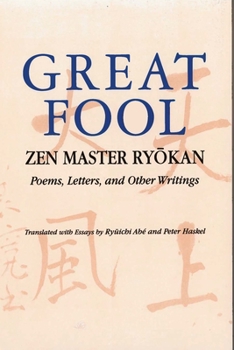Great Fool: Zen Master Ryōkan; Poems, Letters, and Other Writings
Select Format
Select Condition 
Book Overview
Taigu Ryokan (1759-1831) remains one of the most popular figures in Japanese Buddhist history. Despite his religious and artistic sophistication, Ryokan referred to himself as "Great Fool" and refused to place himself within the cultural elite of his age. In contrast to the typical Zen master of his time, who presided over a large monastery, trained students, and produced recondite religious treatises, Ryokan followed a life of mendicancy in the countryside. Instead of delivering sermons, he expressed himself through kanshi (poems composed in classical Chinese) and waka and could typically be found playing with the village children in the course of his daily rounds of begging. Great Fool is the first study in a Western language to offer a comprehensive picture of the legendary poet-monk and his oeuvre. It includes not only an extensive collection of the master's kanshi, topically arranged to facilitate an appreciation of Ryokan's colorful world, but selections of his waka, essays, and letters.
The volume also presents for the first time in English the Ryokan zenji kiwa (Curious Accounts of the Zen Master Ryokan), a firsthand source composed by a former student less than sixteen years after Ryokan's death. Although it lacks chronological order, the Curious Account is invaluable for showing how Ryokan was understood and remembered by his contemporaries. It consists of colorful anecdotes and episodes, sketches from Ryokan's everyday life. To further assist the reader, three introductory essays approach Ryokan from the diverse perspectives of his personal history and literary work.




